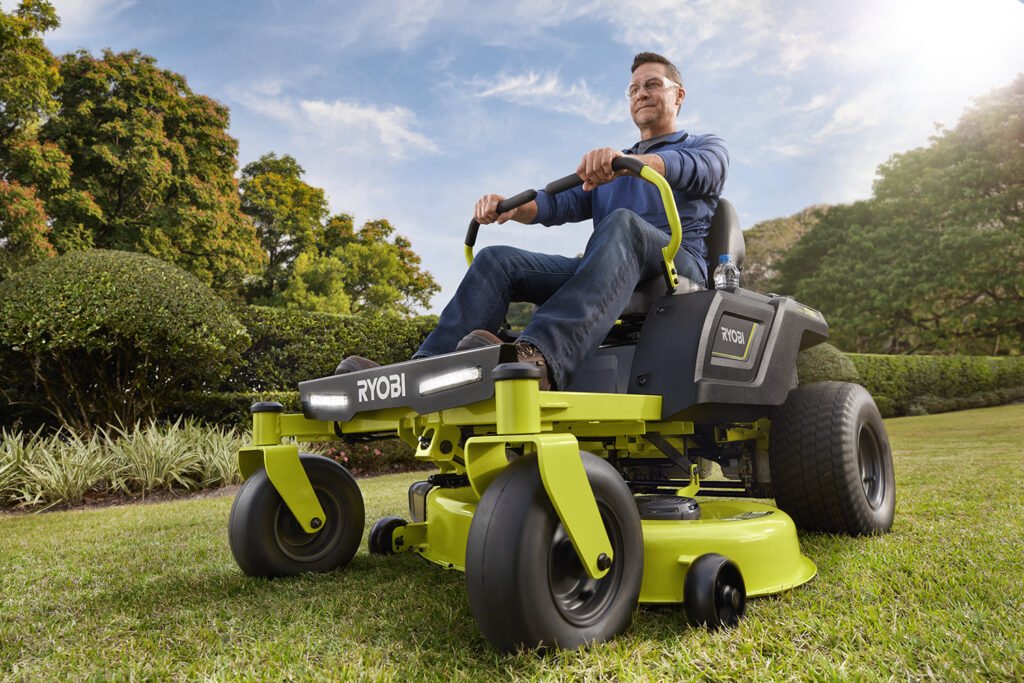Lawnmowers are a staple of suburban life, buzzing through neighborhoods every weekend as homeowners try to keep their yards tidy. However, if you’ve ever mowed your lawn or been in the vicinity of one, you’ve likely noticed how loud and disruptive these machines can be. The noise produced by lawnmowers has long been a point of frustration, but despite advances in technology, it remains a significant issue for many people.
In this article, we will explore the reasons behind the persistent noise of lawnmowers, from engine mechanics to design limitations. We will also discuss the potential health effects of lawnmower noise and why, despite improvements, lawnmowers are still so loud.

The Mechanics Behind Lawn Mower Noise
Internal Combustion Engines: The Main Culprit
At the heart of most lawnmowers is an internal combustion engine (ICE). These engines are the same type found in many small outdoor tools, such as chainsaws, snowblowers, and leaf blowers. Internal combustion engines generate noise through the ignition process, where air and fuel are mixed and combusted within the engine’s cylinders. This explosion creates high-pressure waves that result in sound. The more power an engine produces, the more noise it generates.
Why ICEs are noisy:
- High RPMs (Revolutions per Minute): Lawn mower engines often operate at extremely high RPMs. At these speeds, the moving parts inside the engine, including pistons and valves, create vibrations and sound waves. The higher the RPMs, the more pronounced the noise becomes.
- Exhaust Systems: Most lawnmowers feature basic exhaust systems, which do not effectively dampen noise. Unlike cars, which have complex mufflers designed to reduce engine noise, lawnmowers generally only have a small, simple muffler. This limited exhaust system allows much of the sound to escape, making the engine’s noise louder.
Blade Mechanics and Aerodynamics
Lawnmowers also make noise through their cutting blades. As the blades spin at high speeds to slice through grass, they create a vortex of air that contributes to the overall noise level. This process involves not only the mechanical whir of the blades themselves but also the turbulence created by the air moving around the cutting deck.
The more aggressive the blade design, the louder the mower. Lawn mowers with larger, sharper, and more powerful blades create more air resistance and turbulence, which results in greater noise. Additionally, older or worn-out blades tend to produce more noise due to imbalance or the roughness of their edges.

Factors influencing noise from blades:
- Blade material: Blades made from softer metals or those that are not as finely finished can create more vibrations and noise.
- Blade speed: Faster blade speeds increase air disturbance, resulting in a louder sound.
Design Limitations in Noise Control
Despite being a common household tool, lawnmowers have not undergone as significant a transformation in design compared to other modern machinery. Although electric lawnmowers are becoming more popular, the vast majority of mowers still rely on gas-powered engines, which are inherently loud.
Size and Weight Constraints
Lawnmowers need to strike a balance between power, portability, and cutting efficiency. This is where noise often takes a back seat. Mowers that are too quiet may not provide the necessary power to cut thick grass or large areas, while lightweight models with smaller engines may require the motor to work harder, producing more noise. Manufacturers have not prioritized making these engines quieter, as the primary goal remains functional efficiency in cutting grass quickly and uniformly.
The size of the mower also plays a role in noise production. Smaller mowers, although quieter than larger ones, still tend to be louder than other home appliances. The noise is exacerbated when considering the need for rugged, durable materials that can withstand years of wear and tear. These materials tend to amplify sound rather than absorb it.

Limited Investment in Noise Reduction Technology
Lawnmowers, particularly gas-powered models, have remained relatively unchanged in terms of noise-reduction technology. While other industries have prioritized quieter solutions, such as electric or hybrid engines, lawnmower manufacturers have often focused on improving power, durability, and affordability. The cost of introducing sophisticated noise-damping technology can be high, and many consumers may not prioritize it, choosing instead to invest in more power or a more affordable model.
That said, there are still some efforts to reduce lawnmower noise, particularly with higher-end or specialized models. Some manufacturers are working to integrate advanced mufflers, soundproofing materials, and quieter engine designs into their machines. However, these innovations come at a premium and are not yet widely available across all price points.
The Rise of Electric Lawn Mowers: A Quieter Alternative?
In recent years, electric lawnmowers have gained popularity as a quieter, more eco-friendly alternative to gas-powered models. These mowers are powered by rechargeable batteries or plugged into an electrical outlet, eliminating the need for a noisy internal combustion engine. As a result, electric mowers produce far less noise, making them an attractive option for those living in noise-sensitive environments.
Why Electric Mowers are Quieter:
- No Combustion Engine: Electric mowers don’t rely on internal combustion engines, so they don’t have the noise-producing explosions within the engine cylinders.
- Simpler Mechanics: Electric motors generally have fewer moving parts than their gasoline counterparts, which reduces mechanical noise. This simplicity makes electric mowers inherently quieter.
However, while electric mowers are quieter than gas-powered ones, they are not silent. The motors still produce noise as they power the blades and the wheels. Additionally, electric mowers often have a limited battery life, meaning they may not be as suitable for larger lawns without frequent recharging.

Health Implications of Lawn Mower Noise
Lawnmower noise can be more than just an inconvenience. Prolonged exposure to loud noise can have detrimental effects on both mental and physical health. This is particularly concerning for individuals who mow their lawns regularly or live near noisy neighbors.
Hearing Loss and Auditory Damage
Prolonged exposure to loud noise, such as the sound produced by lawnmowers, can result in hearing loss. According to health experts, exposure to sound levels over 85 decibels (dB) for extended periods can cause hearing damage. Most gas-powered lawnmowers operate at sound levels between 85 to 95 dB, well above the safe threshold for prolonged exposure.
To protect hearing, it is advisable to wear ear protection such as earplugs or earmuffs when mowing the lawn.
Stress and Mental Health
Chronic exposure to noise pollution has been shown to elevate stress levels, disrupt sleep, and contribute to other mental health issues. The constant hum and roar of lawnmowers can be an irritant to those who live in noisy neighborhoods or have a sensitivity to sound.
Increased noise levels can also negatively impact overall well-being, leading to heightened anxiety or frustration. For some, the noise of lawnmowers is simply an unavoidable part of suburban life, but it’s a problem that continues to persist despite technological advancements.

The Future of Lawn Mower Design
There are a few promising trends that may result in quieter lawnmowers in the near future. For one, manufacturers are increasingly turning to electric models, which are quieter by nature than their gas-powered counterparts. As battery technology improves, electric mowers will become more powerful and capable of handling larger lawns without the need for frequent recharging. These advancements will likely contribute to even quieter options on the market.
Other Innovations:
- Noise-Dampening Materials: Manufacturers may integrate more advanced materials designed to absorb sound. These materials could be placed within the engine or around the body of the mower to reduce the amount of noise produced.
- Variable Speed Engines: New engines with variable speed options could reduce noise by operating at lower speeds when full power isn’t needed.
- Improved Blade Designs: Research into quieter blade designs, including aerodynamic changes that reduce air resistance, could make the cutting process significantly quieter.
Conclusion: The Nicosail Brand and a Quieter Future
Despite advancements in mower technology, lawnmowers remain a noisy part of everyday life. However, electric mowers represent a growing solution for those who value quietness alongside efficiency. When looking for a quieter, more efficient alternative to traditional gas-powered lawnmowers, the Nicosail brand offers an excellent choice. Known for their innovative and eco-friendly approach to outdoor tools, Nicosail mowers combine quiet electric motors with durable and efficient cutting systems. They are a great investment for homeowners who want to reduce the noise pollution in their neighborhoods while maintaining a beautifully manicured lawn.
Nicosail offers a range of models designed with cutting-edge features, ensuring you get both a quiet and efficient mowing experience. Their focus on reducing noise without sacrificing performance makes them one of the top choices for eco-conscious consumers seeking a quieter, more pleasant mowing experience.
In conclusion, while lawnmowers may still be loud due to their engine mechanics and design constraints, alternatives like electric mowers are emerging as the future of quieter, greener lawn care. Brands like Nicosail are leading the way in this transformation, offering solutions that are not only quieter but also more sustainable.




